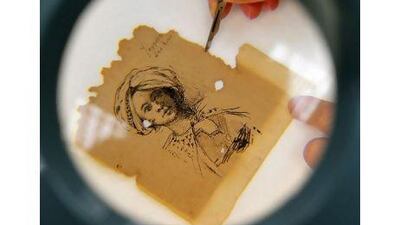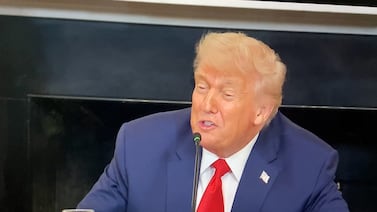Ancient manuscripts are treated like hospital patients at a famous book-restoration institute in Rome that has worked on everything from the Dead Sea Scrolls to one of the oldest Qurans in the world.
"Look at this poor man suffering!" exclaimed Marina Bicchieri, head of the chemistry department at the Institute of the Pathology of the Book, as she examined oxidation levels on the unique institution's most recent project.
Bicchieri was looking at a chart with the scientific analysis of one of the last letters written by a captive Aldo Moro, a former Italian prime minister who was kidnapped and killed by far-left Red Brigades militants in 1978.
Founded in 1938 to preserve Italy's priceless archives, the laboratory is tucked away inside a walled garden in the city centre. "This interdisciplinary institute was the first of its kind in the world," Bicchieri said.
The museum is filled with books suffering from the worst kinds of ailments — including one with a hole as big as a fist (eaten by termites) and another riddled with bullet holes from the Battle of Monte Cassino during the Second World War.
The institute is the main point of reference for book and archive restoration in Italy but also does work for the Vatican and internationally.
One recent research project was carried out on fragments of Quranic manuscripts found in Sanaa in Yemen dating back to at least the eighth century.
Researchers are so keen they even donated blood to carry out experiments after finding that an ink with human blood had been used to write the Dead Sea Scrolls — apparently because of its iron content to help stabilise colours.
"The main problems we see are linked to water, heat, dust and insects," said Flavia Pinzari, head of the biology department.
Their projects can be long- running but also emergency interventions.
"Following the recent flooding in Tuscany, we were called by the local authorities to help them with flooded archives," Pinzari said.
"We told them to freeze the books, since that stops the water from diluting the ink and micro- organisms from propagating. Then we can vaporise the frozen water, avoiding damage linked to the water," she said.
The institute brings together scientists as well as literature specialists and artisans with a range of skills from traditional book binding, to the production of parchment, to the restoration of mediaeval illuminations.
They work with X-ray microscopes but also pincers, old printing presses and special machinery that ages paper artificially.
"We consult old recipes, some of them mediaeval, to make colours and certain types of ink," Pinzari said.
They also rely on specialised firms in Italy and abroad, including one in Japan that makes a special paper used to "reconstruct" damaged pages.
It is painstaking work, as shown by a restorer of one of the Moro letters who attached a tiny fragment of the Japanese paper to one of the pages and fixed it with a special ultra-thin plastic film developed in Rome.
The institute's book restoration course lasts a full five years.
"Books don't like moving, travelling. They adapt to their environment even when it's not ideal and it is the change in temperature and humidity and manipulation that cause the majority of damage," said Bicchieri.
Pinzari added: "But even the most ancient books were written and made to be read. We therefore have to find the right middle ground between consultation and conservation."
artslife@thenational.ae
Which honey takes your fancy?
Al Ghaf Honey
The Al Ghaf tree is a local desert tree which bears the harsh summers with drought and high temperatures. From the rich flowers, bees that pollinate this tree can produce delicious red colour honey in June and July each year
Sidr Honey
The Sidr tree is an evergreen tree with long and strong forked branches. The blossom from this tree is called Yabyab, which provides rich food for bees to produce honey in October and November. This honey is the most expensive, but tastiest
Samar Honey
The Samar tree trunk, leaves and blossom contains Barm which is the secret of healing. You can enjoy the best types of honey from this tree every year in May and June. It is an historical witness to the life of the Emirati nation which represents the harsh desert and mountain environments
What are the GCSE grade equivalents?
- Grade 9 = above an A*
- Grade 8 = between grades A* and A
- Grade 7 = grade A
- Grade 6 = just above a grade B
- Grade 5 = between grades B and C
- Grade 4 = grade C
- Grade 3 = between grades D and E
- Grade 2 = between grades E and F
- Grade 1 = between grades F and G
MOUNTAINHEAD REVIEW
Starring: Ramy Youssef, Steve Carell, Jason Schwartzman
Director: Jesse Armstrong
Rating: 3.5/5
UK-EU trade at a glance
EU fishing vessels guaranteed access to UK waters for 12 years
Co-operation on security initiatives and procurement of defence products
Youth experience scheme to work, study or volunteer in UK and EU countries
Smoother border management with use of e-gates
Cutting red tape on import and export of food
Company%C2%A0profile
%3Cp%3E%3Cstrong%3EName%3A%20%3C%2Fstrong%3EPyppl%3C%2Fp%3E%0A%3Cp%3E%3Cstrong%3EEstablished%3A%20%3C%2Fstrong%3E2017%3C%2Fp%3E%0A%3Cp%3E%3Cstrong%3EFounders%3A%20%3C%2Fstrong%3EAntti%20Arponen%20and%20Phil%20Reynolds%26nbsp%3B%3C%2Fp%3E%0A%3Cp%3E%3Cstrong%3EBased%3A%3C%2Fstrong%3E%20UAE%3C%2Fp%3E%0A%3Cp%3E%3Cstrong%3ESector%3A%3C%2Fstrong%3E%20financial%20services%3C%2Fp%3E%0A%3Cp%3E%3Cstrong%3EInvestment%3A%3C%2Fstrong%3E%20%2418.5%20million%3C%2Fp%3E%0A%3Cp%3E%3Cstrong%3EEmployees%3A%3C%2Fstrong%3E%20150%3C%2Fp%3E%0A%3Cp%3E%3Cstrong%3EFunding%20stage%3A%3C%2Fstrong%3E%20series%20A%2C%20closed%20in%202021%3C%2Fp%3E%0A%3Cp%3E%3Cstrong%3EInvestors%3A%3C%2Fstrong%3E%20venture%20capital%20companies%2C%20international%20funds%2C%20family%20offices%2C%20high-net-worth%20individuals%3C%2Fp%3E%0A
Jetour T1 specs
Engine: 2-litre turbocharged
Power: 254hp
Torque: 390Nm
Price: From Dh126,000
Available: Now
Four reasons global stock markets are falling right now
There are many factors worrying investors right now and triggering a rush out of stock markets. Here are four of the biggest:
1. Rising US interest rates
The US Federal Reserve has increased interest rates three times this year in a bid to prevent its buoyant economy from overheating. They now stand at between 2 and 2.25 per cent and markets are pencilling in three more rises next year.
Kim Catechis, manager of the Legg Mason Martin Currie Global Emerging Markets Fund, says US inflation is rising and the Fed will continue to raise rates in 2019. “With inflationary pressures growing, an increasing number of corporates are guiding profitability expectations downwards for 2018 and 2019, citing the negative impact of rising costs.”
At the same time as rates are rising, central bankers in the US and Europe have been ending quantitative easing, bringing the era of cheap money to an end.
2. Stronger dollar
High US rates have driven up the value of the dollar and bond yields, and this is putting pressure on emerging market countries that took advantage of low interest rates to run up trillions in dollar-denominated debt. They have also suffered capital outflows as international investors have switched to the US, driving markets lower. Omar Negyal, portfolio manager of the JP Morgan Global Emerging Markets Income Trust, says this looks like a buying opportunity. “Despite short-term volatility we remain positive about long-term prospects and profitability for emerging markets.”
3. Global trade war
Ritu Vohora, investment director at fund manager M&G, says markets fear that US President Donald Trump’s spat with China will escalate into a full-blown global trade war, with both sides suffering. “The US economy is robust enough to absorb higher input costs now, but this may not be the case as tariffs escalate. However, with a host of factors hitting investor sentiment, this is becoming a stock picker’s market.”
4. Eurozone uncertainty
Europe faces two challenges right now in the shape of Brexit and the new populist government in eurozone member Italy.
Chris Beauchamp, chief market analyst at IG, which has offices in Dubai, says the stand-off between between Rome and Brussels threatens to become much more serious. "As with Brexit, neither side appears willing to step back from the edge, threatening more trouble down the line.”
The European economy may also be slowing, Mr Beauchamp warns. “A four-year low in eurozone manufacturing confidence highlights the fact that producers see a bumpy road ahead, with US-EU trade talks remaining a major question-mark for exporters.”
Famous left-handers
- Marie Curie
- Jimi Hendrix
- Leonardo Di Vinci
- David Bowie
- Paul McCartney
- Albert Einstein
- Jack the Ripper
- Barack Obama
- Helen Keller
- Joan of Arc
Retirement funds heavily invested in equities at a risky time
Pension funds in growing economies in Asia, Latin America and the Middle East have a sharply higher percentage of assets parked in stocks, just at a time when trade tensions threaten to derail markets.
Retirement money managers in 14 geographies now allocate 40 per cent of their assets to equities, an 8 percentage-point climb over the past five years, according to a Mercer survey released last week that canvassed government, corporate and mandatory pension funds with almost $5 trillion in assets under management. That compares with about 25 per cent for pension funds in Europe.
The escalating trade spat between the US and China has heightened fears that stocks are ripe for a downturn. With tensions mounting and outcomes driven more by politics than economics, the S&P 500 Index will be on course for a “full-scale bear market” without Federal Reserve interest-rate cuts, Citigroup’s global macro strategy team said earlier this week.
The increased allocation to equities by growth-market pension funds has come at the expense of fixed-income investments, which declined 11 percentage points over the five years, according to the survey.
Hong Kong funds have the highest exposure to equities at 66 per cent, although that’s been relatively stable over the period. Japan’s equity allocation jumped 13 percentage points while South Korea’s increased 8 percentage points.
The money managers are also directing a higher portion of their funds to assets outside of their home countries. On average, foreign stocks now account for 49 per cent of respondents’ equity investments, 4 percentage points higher than five years ago, while foreign fixed-income exposure climbed 7 percentage points to 23 per cent. Funds in Japan, South Korea, Malaysia and Taiwan are among those seeking greater diversification in stocks and fixed income.
• Bloomberg




